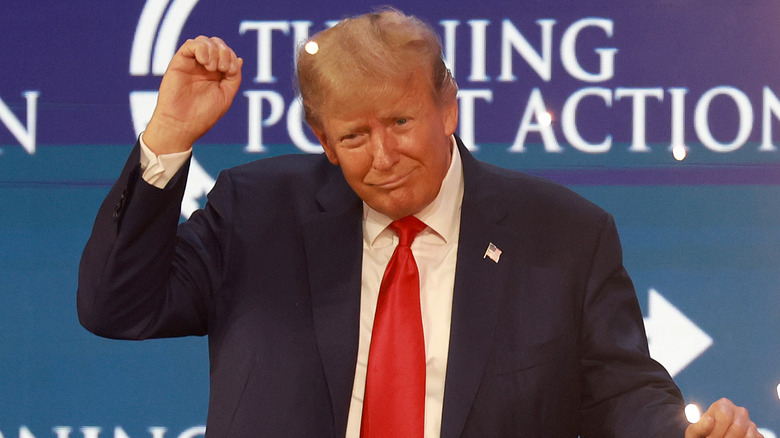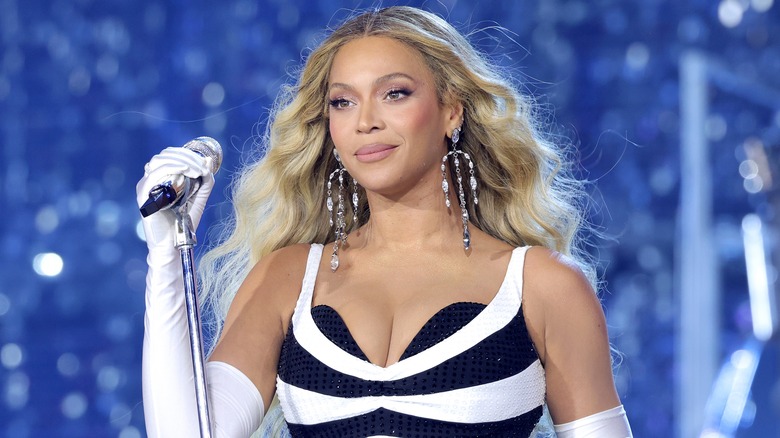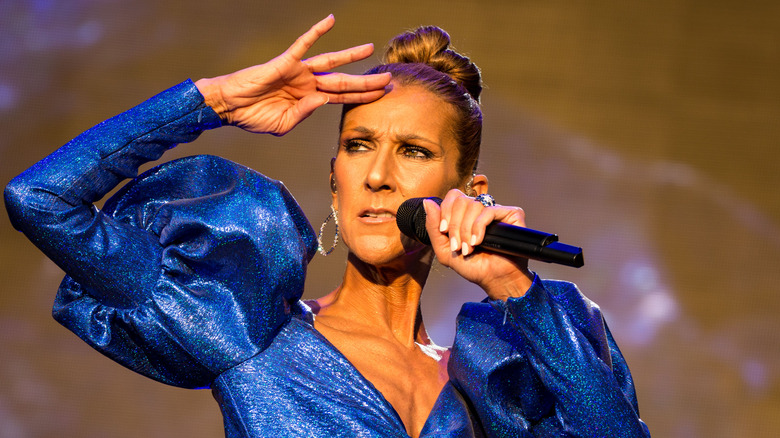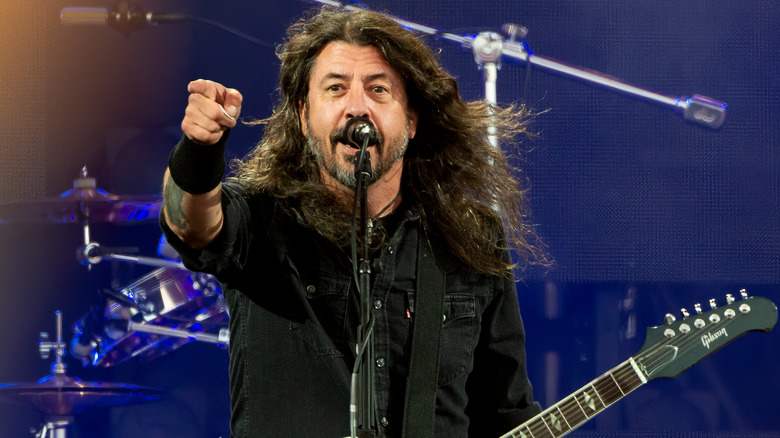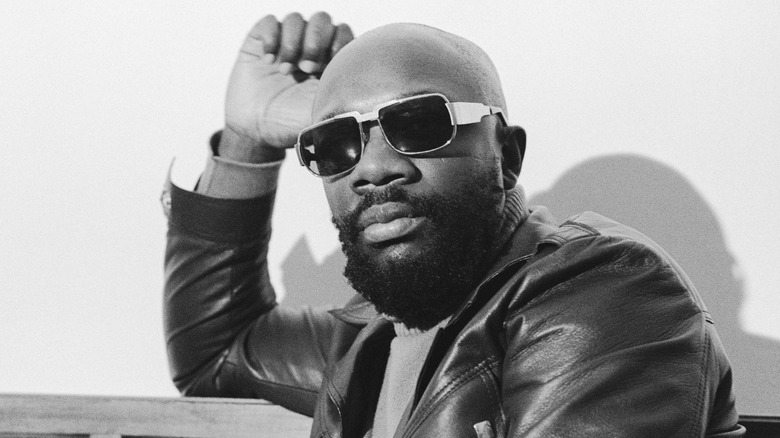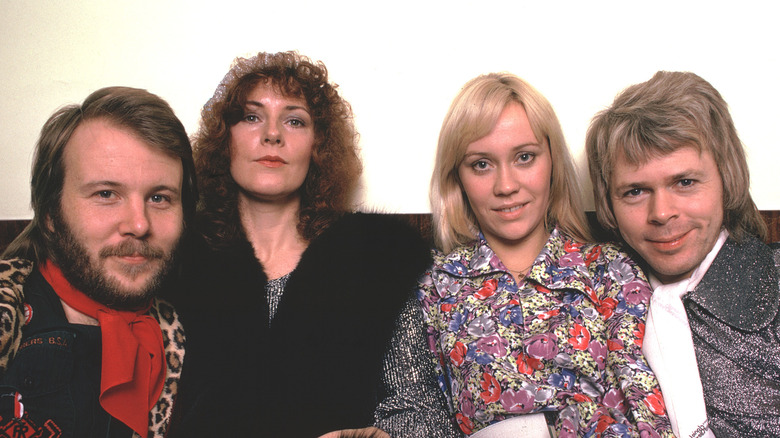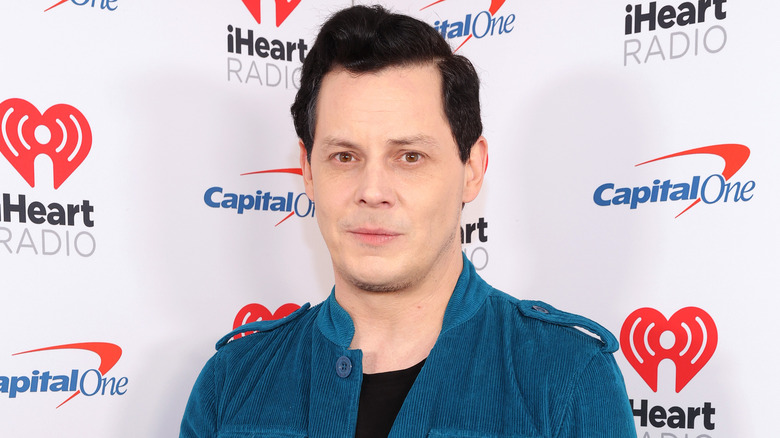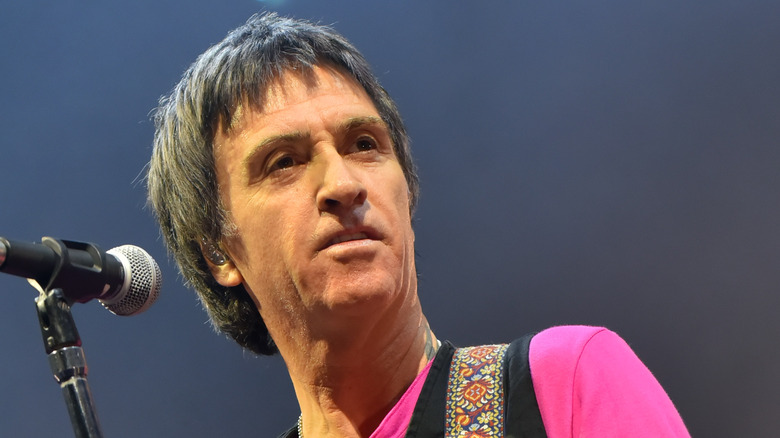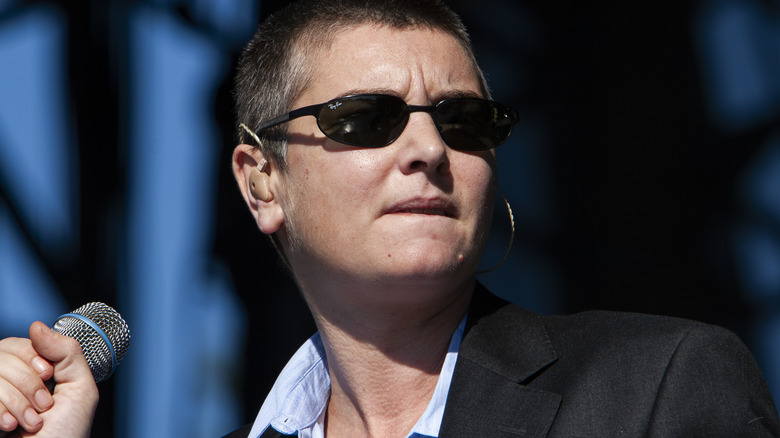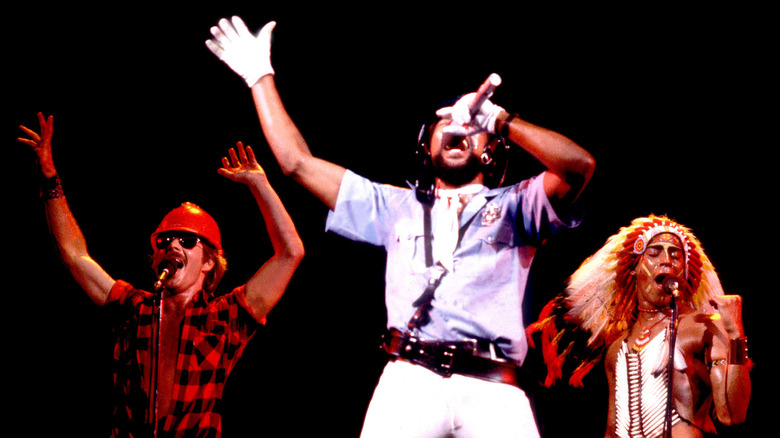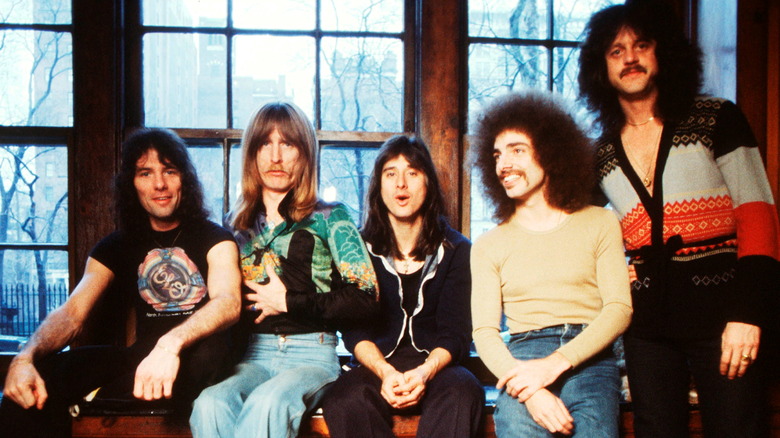Musicians Who Can't Stand Trump (And Are Ready To Fight)
Politicians often have musicians who support them, and former President Donald Trump is no exception. Some of the musicians in Trump's corner include Kid Rock and Lee Greenwood, but the list isn't very long. The artists who do support Trump show up at his rallies and events to throw their weight behind the candidate of their choosing, but not all of the music played during those appearances is from artists who have endorsed him.
Trump — or more likely his campaign staff and event coordinators — often plays music that comes from other artists' catalogs. Most of the time, this goes by without any issue, but occasionally, it comes out that a Trump event featured music from an artist on the opposite side of the political spectrum. That's when problems arise because, without an artist's permission, it can violate their copyright to wantonly play music that's not given prior approval.
When Trump's campaign crosses a musical line, the result can often see artists publicly admonish and threaten legal action. In some cases, the problem isn't so much about the lack of a license as it is about the artist not wanting to be associated with Trump, his message, or his campaign. The list of musicians who oppose Trump is lengthy and includes some of the biggest names in the industry.
Beyoncé hit Donald Trump with a cease and desist over Freedom
Beyoncé stepped her toe in the political arena during the 2024 presidential campaign, not by choice, but because the Trump campaign used her 2016 song, "Freedom," without her permission. The track can be heard in a 13-second video posted by campaign spokesperson Steven Cheung on his X, formerly known as Twitter, account. In the video, which has since been removed by Cheung, Trump disembarks a plane in Michigan during a campaign stop, with "Freedom" playing in the background. This is ironic, given that the song was already the unofficial track of the Kamala Harris campaign, adding insult to injury.
Someone close to Beyoncé told Rolling Stone that the Trump campaign didn't request to use the track for any political messaging, or for any purpose, before posting. This resulted in Beyoncé's label issuing a cease and desist letter to the campaign. Conversely, the Harris campaign asked for and received permission to include "Freedom" in its published content.
The song has encapsulated the Harris campaign's themes, and seeing as it received permission, Beyoncé supports Harris over Trump. This is hardly surprising, given how many celebrities have endorsed Harris, including a polarizing post from Taylor Swift. Beyoncé and Swift are two of the biggest celebrities on the planet, so their endorsement, and permission to use their music, is a big win for Harris. Trump, on the other hand, continues to violate the intellectual property of many artists, landing Trump on Beyoncé's bad side.
Céline Dion didn't approve the use of her most popular song
Céline Dion has many hit songs, but "My Heart Will Go On" is, without a doubt, the most significant. The track framed the 1997 film, "Titanic," and more than that, it's a beautiful song that few people can sing as well as Dion. Most folks enjoy "My Heart Will Go On," including Donald Trump, as the track is included in his rally playlist. Dion and her record label never gave approval to use the song, and Trump's continued use resulted in a fiery Instagram post.
Sony Music Entertainment posted on Dion's behalf that it was aware of the unauthorized use of the song, which had been played at an August 2024 Montana Trump rally. The post continued: "In no way is this use authorized, and Celine Dion does not endorse this or any similar use ... And really, THAT song?" That raised some eyebrows, but Sony and Dion weren't the only affected parties to lay waste to the Trump campaign's illegal use of the song.
The family of the composer of "Titanic," the late James Horner, issued an add-on in a statement to Billboard, saying that the Horner family also opposes any use of his music. His wife and daughter wrote, "The campaign does not reflect the beliefs and values of James Horner or his family." While no cease and desist letter was made public, nor is it clear whether or not the Trump campaign continued using the song, but if it continued to be used, there's little doubt the affected parties would pursue legal action.
The Foo Fighters had a one-word response to the campaign's use of My Hero
The Foo Fighters took umbrage with the Trump campaign in August 2024 after the band's song, "My Hero," was played during a rally in Arizona. During the event, the track played as Robert F. Kennedy Jr. walked on stage to announce his support for Donald Trump. RFK Jr. is a polarizing figure, and it seems that neither the Trump campaign nor the unusual Kennedy are supported by the Foo Fighters. Not long after the music was used without permission, the band made it clear with a one-word post on X: "No."
A spokesperson for The Foo Fighters later spoke with Billboard, expanding on the one-word response, saying that the band "would not have granted" permission to use the track. The spokesperson also said that they were taking action against the use of "My Hero," but didn't expand on what that meant. Most likely, it would be in the form of a cease and desist.
Ultimately, the Trump campaign refuted the lack of permission. Campaign spokesperson Steven Cheung posted, "It's Times Like These facts matter, don't be a Pretender @foofighters." Along with the tweet, he posted a screenshot from an article from The Independent the seemingly verified that the campaign obtained permission from BMI's Songview service. The band's frontman, Dave Grohl, has been an outspoken critic of Trump for years, so it's unsurprising that the band objected to the campaign's use of its music.
Isaac Hayes' estate took the Trump campaign to court
Isaac Hayes was a leading recording artist who wrote and performed some of the most iconic songs of his generation. Hayes died in 2008, so while he personally couldn't object to the Trump campaign's use of his music, his estate was more than happy to oblige. During the 2024 presidential campaign, the Trump team was caught playing a hit that the late singer co-wrote, "Hold On, I'm Coming," at multiple rallies and campaign events. The singer's estate and his son, Isaac Hayes III, came out swinging against the Trump campaign, not settling for a simple post on social media.
In August 2024, the Hayes estate took its case to federal court, and soon after filing, they landed a win. Hayes III posted on X that a federal court granted an emergency hearing over the issue. The estate sought an injunctive relief, which is a type of court order that orders a party to start or stop an action. In this case, the injunctive relief, which was granted, legally forbade the Trump campaign from using the 1966 song.
Hayes III posted more on X, explaining that the request went out on the anniversary of his father's death. He included the fact that the song had repeatedly been played at multiple events despite requests to stop. Additionally, Hayes III demanded an immediate end of the use of his father's song and a payment of $3 million to cover the licensing fees that would have been paid had the Hayes estate granted use of the song.
ABBA denied permission for the Trump campaign to play its songs
ABBA is a band with a ton of iconic music that has permeated the zeitgeist for generations. It's not surprising that a political campaign would want to play something like "Mamma Mia," "Waterloo," or any of the hits in ABBA's catalog. Of course, a campaign still requires permission to do so, and according to ABBA, that didn't happen with the Trump campaign. When it became clear that the campaign was playing ABBA's hits without permission, the band and its record label, Universal Music, took notice.
Universal Music released a statement in August 2024, explaining that it was aware of several videos of Trump campaign events featuring ABBA's music. The statement was clear that the Trump campaign didn't have permission to play ABBA's songs. The event that seems to have set off ABBA's legal action against the Trump campaign took place in St. Cloud, Minnesota. Videos from the event show clips of ABBA's music videos and its songs "Money, Money, Money," "The Winner Take All," and "Dancing Queen."
According to Consequence Sound, the Trump campaign has a license to play ABBA's music through wide-reaching ASCAP and BMI licenses. While this is true, an artist can opt out, which ABBA has done. This opens the door for legal action, including fining $150,000 for each use of a song without permission. ABBA asked the Trump campaign to cease and desist from using its music, though it's unclear if this request was honored or even acknowledged.
The White Stripes took Trump to court over Seven Nation Army
Jack White of The White Stripes came out swinging when one of Donald Trump's employee, named Margo Martin, played "Seven Nation Army" over a video of the candidate in a since-deleted post on X. After learning of the illicit use of the song, White took to social media in August 2024 to make his feelings known and included the offending video, which shows Trump walking up some stairs to board his plane with the iconic guitar riff playing in the background.
White posted on Instagram, "Oh ... Don't even think about using my music, you fascists. Law suit coming from my lawyers about this (to add to your 5 thousand others.) Have a great day at work today, Margo Martin. And as long as I'm here, a double f*** you, DonOLD, for insulting our nation's veterans at Arlington, you scum. You should lose every military family's vote immediately from that if ANYTHING makes sense anymore."
Jack and his ex-wife and White Stripes bandmate, Meg White, took the matter to court in September 2024, filing a lawsuit against the former president for using the song in the airplane video. The couple claimed that Trump violated copyright law and gave no indication they would back down. In the court filing (via The Washington Post), the Whites called the illegal use of "Seven Nation Army" to be a "flagrant misappropriation" of their intellectual property.
The Smiths' Johnny Marr quickly shut down the Trump campaign
The Smiths have several popular tracks in its catalog, and like other popular bands, its music is often played at political events. The band's guitarist and co-songwriter, Johnny Marr, found out in January 2024 that the Trump campaign had played "Please, Please, Please, Let Me Get What I Want" at a rally, and he took to X to call it out. Marr retweeted a post with the comment, "You actually hear The Smiths more often than you'd think at 2024 Trump rallies," and it's fair to say that Marr wasn't happy stumbling across the post.
The included video features a camera sweeping across the stadium seating with the track playing loudly. Marr's post included a very clear indication that he wasn't happy his song was used without permission, writing, "Ahh ... right ... OK. I never in a million years would've thought this could come to pass. Consider this s*** shut right down right now." While Marr included the one video retweet, the use of The Smiths' music during that one event wasn't a one-time thing.
Marr has historically been outspoken about liberal causes, so it's unsurprising he wasn't happy finding out that Trump used his music. The band's frontman, Morrissey, hasn't openly discussed the issue, but he's criticized Trump previously. In a 2017 Der Spiegel interview, he said he'd push a button to kill Trump "for the safety of the human race" but later walked back his comments.
Sinéad O'Connor's estate was disgusted by the Trump campaign's violation
Sinéad O'Connor died in July 2023, and if you know anything about her, you know she was never shy about speaking her mind. She marred her career and was banned from "Saturday Night Live" for tearing up a picture of the Pope, and she'd been outspoken on issues important to her ever since. O'Connor was no fan of Donald Trump, so when her estate got wind of her hit song, "Nothing Compares 2 U," being played at several campaign rallies, it took action right away.
In March 2024, her estate and label Chrysalis Records issued a cease and desist to the Trump campaign, acknowledging O'Connor's moral code, which was "defined by honesty, kindness, fairness, and decency towards her fellow human beings," in a statement to Variety. The label was outraged to learn of the illicit use of the track, noting, "It is no exaggeration to say that Sinéad would have been disgusted, hurt and insulted to have her work misrepresented in this way by someone who she herself referred to as a 'biblical devil.'"
That's a scathing indictment of Trump, but it aligns with O'Connor's public image and moral integrity. It's likely that had she been alive when this happened, she'd readily tear up a picture of Trump for all the world to see. While that can't happen, her estate and label took what action they could by ordering the campaign to immediately cease and desist from playing O'Connor's music at any event associated with Trump.
The Village People issued a cease and desist against the Trump campaign
If you've ever seen a video of Donald Trump "dancing" while on stage, there's a good chance he was doing so to one of The Village People's songs. There are several infamous clips of him shaking his fists to The Village People's "Y.M.C.A.," which is easily the band's best-known track. Needless to say, The Village People aren't happy about this flagrant violation of the band's IP and issued a cease and desist order to the Trump campaign. Sadly, the latest complaint from May 2023 is hardly the first time the band and its representation had to demand the campaign stop playing The Village People's music.
In May 2023, the band's lead singer, Victor Wills, and his wife/manager, Karen Willis, sent a cease and desist letter, specifically calling out a video showing a band dressed up as The Village People dancing to their track, "Macho Man," at Trump's Mar-a-Lago resort. The letter pointed out how the look-alike group made "many fans, and the general public as well, mistakenly believe" the group performing "Macho Man" at the event were the real Village People. While the band clearly doesn't support Trump's 2024 White House bid, the two parties ran afoul of one another previously.
During Trump's 2020 campaign, Willis demanded in a social media post (via Rolling Stone) that Trump cease using the band's music, noting that Trump's reaction to Black Lives Matter protests around the country was problematic. He added, "And I ask that you no longer use any of my music at your rallies, especially 'Y.M.C.A.,' and 'Macho Man.' Sorry, but I can no longer look the other way." Unfortunately, the Trump campaign didn't listen and continued using The Village People's crowd-pleasing, rousing songs.
Journey's infighting led to a cease and desist for Trump and band member Jonathan Cain
Donald Trump announced his 2024 bid for the office of the president all the way back in 2022. One month after he entered the race, he landed a cease and desist order from Journey's Neal Schon, who some have called one of the biggest jerks in music. The interesting thing about this particular cease and desist is that it wasn't directed at Trump — it was levied at the band's keyboardist, Jonathan Cain, over his performance of "Don't Stop Believin'" at Mar-a-Lago soon after the announcement.
Schon's letter (via Variety) specifically noted that Cain was playing to a chorus of Kimberly Guilfoyle, Kari Lake, and Marjorie Taylor Greene. While the cease and desist was over a member of the band playing Journey's music at a Trump event, the campaign was also impacted since Schon demanded that Cain not perform any Journey song at any political event.
Seeing as Cain is a Trump supporter and a member of his inner circle, the letter included text addressing this, stating, "Although Mr. Cain is free to express his personal beliefs and associations when he does that on behalf of Journey or for the band, such conduct is extremely deleterious to the Journey brand as it polarizes the band's fans and outreach. Journey is not, and should not be, political."

